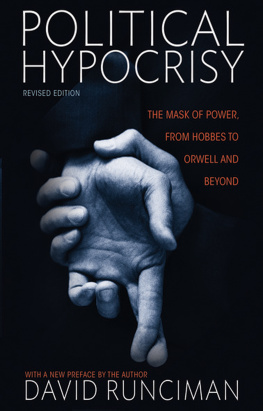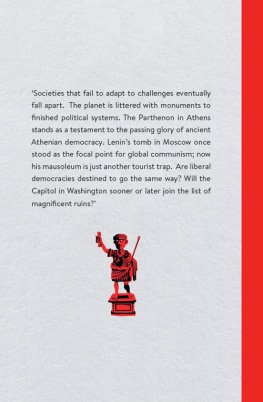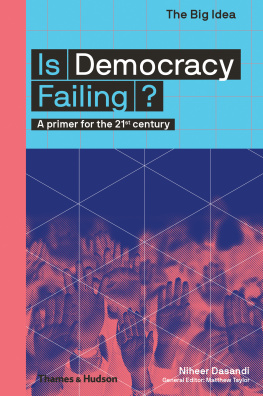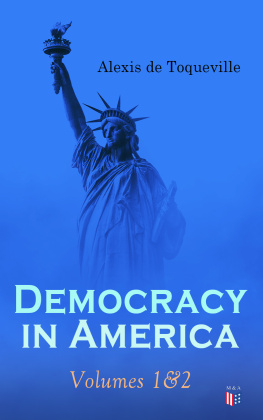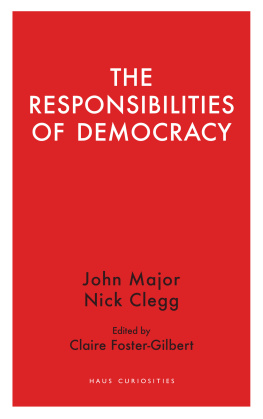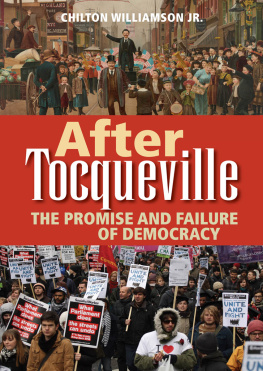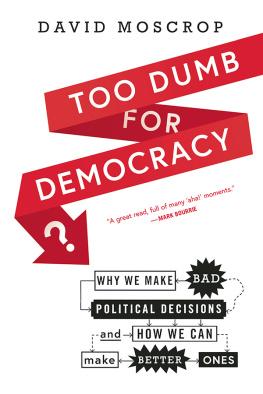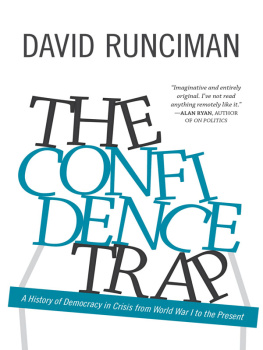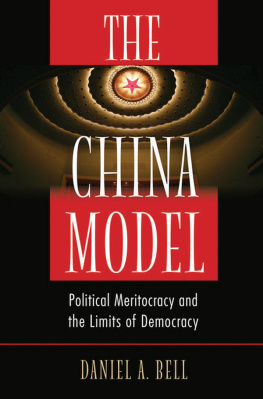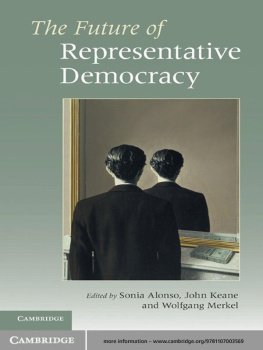
David Runciman is Professor of Politics at Cambridge University and Head of the Department of Politics and International Studies. He is the author of five previous books, including Political Hypocrisy, The Confidence Trap and Politics (for the Ideas in Profile series). He writes regularly about politics for the London Review of Books and hosts the widely acclaimed weekly podcast Talking Politics.
Also by David Runciman
Politics
The Confidence Trap
Political Hypocrisy
The Politics of Good Intentions

First published in Great Britain in 2018 by
Profile Books Ltd
3 Holford Yard
Bevin Way
London
WC1X 9HD
www.profilebooks.com
Copyright David Runciman, 2018
The moral right of the author has been asserted.
All rights reserved. Without limiting the rights under copyright reserved above, no part of this publication may be reproduced, stored or introduced into a retrieval system, or transmitted, in any form or by any means (electronic, mechanical, photocopying, recording or otherwise), without the prior written permission of both the copyright owner and the publisher of this book.
A CIP catalogue record for this book is available from the British Library.
eISBN 978 178283 4120
Contents
PREFACE
Thinking the unthinkable
NOTHING LASTS FOREVER . At some point democracy was always going to pass into the pages of history. No one, not even Francis Fukuyama who announced the end of history back in 1989 has believed that its virtues make it immortal. But until very recently, most citizens of Western democracies would have imagined that the end was a long way off. They would not have expected it to happen in their lifetimes. Very few would have thought it might be taking place before their eyes.
Yet here we are, barely two decades into the twenty-first century, and almost from nowhere the question is upon us: is this how democracy ends?
Like many people, I first found myself confronting this question after the election of Donald Trump to the presidency of the United States. To borrow a phrase from philosophy, it looked like the reductio ad absurdum of democratic politics: any process that produces such a ridiculous conclusion must have gone seriously wrong somewhere along the way. If Trump is the answer, we are no longer asking the right question. But its not just Trump. His election is symptomatic of an overheated political climate that appears increasingly unstable, riven with mistrust and mutual intolerance, fuelled by wild accusations and online bullying, a dialogue of the deaf drowning each other out with noise. In many places, not just the United States, democracy is starting to look unhinged.
Let me make it clear at the outset: I dont believe that Trumps arrival in the White House spells the end of democracy. Americas democratic institutions are designed to withstand all kinds of bumps along the road and Trumps strange, erratic presidency is not outside the bounds of what can be survived. It is more likely that his administration will be followed by something relatively routine than by something even more outlandish. However, Trumps arrival in the White House poses a direct challenge: What would democratic failure in a country like the United States actually involve? What are the things that an established democracy could not survive? We now know we ought to start asking these questions. But we dont know how to answer them.
Our political imaginations are stuck with outdated images of what democratic failure looks like. We are trapped in the landscape of the twentieth century. We reach back to the 1930s or to the 1970s for pictures of what happens when democracy falls apart: tanks in the streets; tin-pot dictators barking out messages of national unity, violence and repression in tow. Trumps presidency has drawn widespread comparison with tyrannies of the past. We have been warned not to be complacent in thinking it couldnt happen again. But what of the other danger: that while we are looking out for the familiar signs of failure, our democracies are going wrong in ways with which we are unfamiliar? This strikes me as the greater threat. I do not think there is much chance that we are going back to the 1930s. We are not at a second pre-dawn of fascism, violence and world war. Our societies are too different too affluent, too elderly, too networked and our collective historical knowledge of what went wrong then is too entrenched. When democracy ends, we are likely to be surprised by the form it takes. We may not even notice that it is happening because we are looking in the wrong places.
Contemporary political science has little to say about new ways that democracy might fail because it is preoccupied with a different question: how democracy gets going in the first place. This is understandable. During the period that democracy has spread around the world the process has often been two steps forward, one step back. Democracy might get tentatively established in parts of Africa or Latin America or Asia and then a coup or military takeover would snuff it out, before someone tried again. This has happened in places from Chile to South Korea to Kenya. One of the central puzzles of political science is what causes democracy to stick. It is fundamentally a question of trust: people with something to lose from the results of an election have to believe it is worth persevering until the next time. The rich need to trust that the poor wont take their money. The soldiers need to trust that the civilians wont take their guns. Often, that trust breaks down. Then democracy falls apart.
As a result, political scientists tend to think of democratic failure in terms of what they call backsliding. A democracy reverts back to the point before lasting confidence in its institutions could be established. This is why we look for earlier examples of democratic failure to illuminate what might go wrong in the present. We assume that the end of democracy takes us back to the beginning. The process of creation goes into reverse.
In this book I want to offer a different perspective. What would political failure look like in societies where confidence in democracy is so firmly established that it is hard to shake? The question for the twenty-first century is how long we can persist with institutional arrangements we have grown so used to trusting, that we no longer notice when they have ceased to work. These arrangements include regular elections, which remain the bedrock of democratic politics. But they also encompass democratic legislatures, independent law courts and a free press. All can continue to function as they ought while failing to deliver what they should. A hollowed-out version of democracy risks lulling us into a false sense of security. We might continue to trust in it and to look to it for rescue, even as we seethe with irritation at its inability to answer the call. Democracy could fail while remaining intact.
This analysis might seem at odds with the frequent talk about the loss of trust in democratic politics and politicians across Western societies. It is true that many voters dislike and distrust their elected representatives now more than ever. But it is not the kind of loss of trust that leads people to take up arms against democracy. Instead, it is the kind that leads them to throw up their arms in despair. Democracy can survive that sort of behaviour for a long time. Where it ends up is an open question and one I will try to answer. But it does not end up in the 1930s.
Next page

